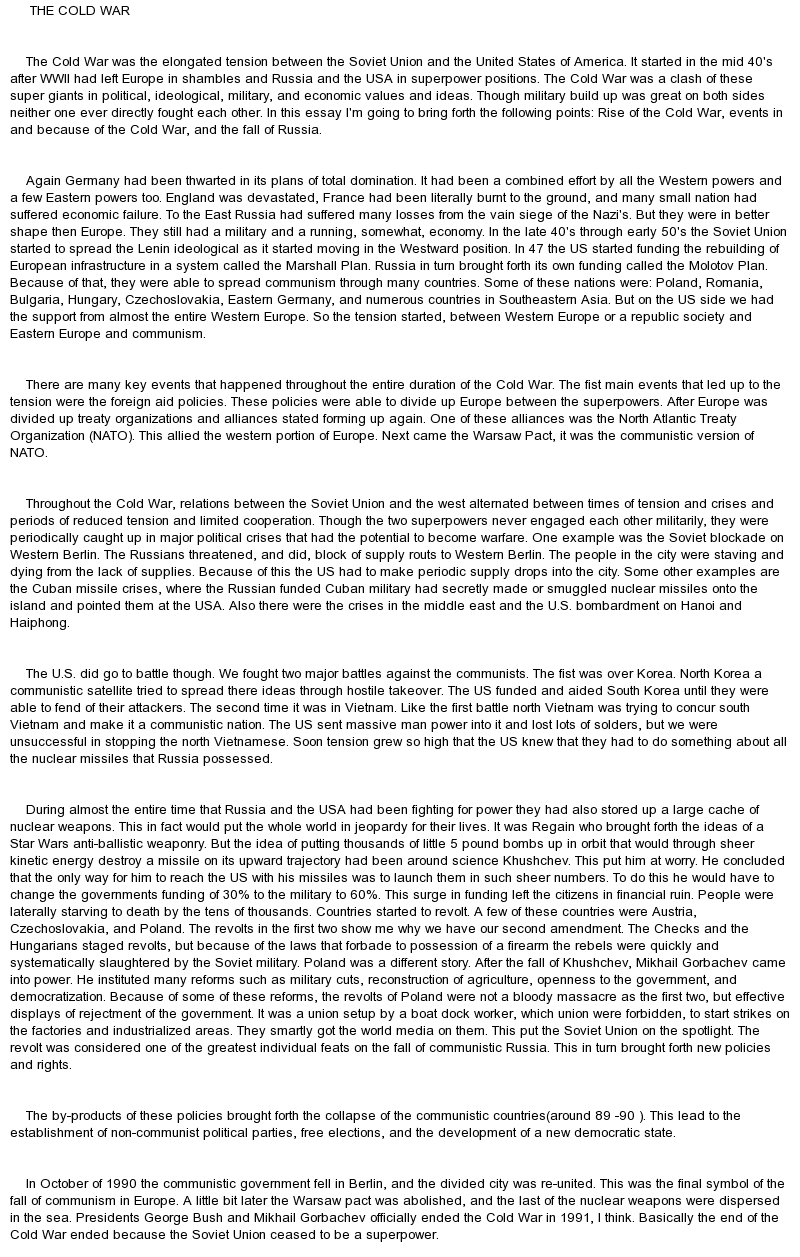Essay about cold war in cuba - Essay: What role did Cuba play in the development of the Cold War? | Cold War | Fidel Castro
Free cuba papers, essays, and research papers. The Embargo on Cuba was a part of America’s Cold War strategy against the Soviet Union.
The communist alliance was dominated by the Soviet Union and its conquered satellite states.

Satellite states was a political term at the time used to refer to a country. Hindsight is a wonderful tool, but sometimes it can skew your perspective.
Vietnam, Cuba and the Cold War
Specifically, don't write a history paper from the perspective that the way events turned out is the only way that they could have turned out. Always put yourselves in the shoes of the people of the time—at least as best as you can.
With regard to the Cold War, it's vital that you don't write your essay as if the outcome was a foregone conclusion. Yes, the United States exists and the Soviet Union does not.
Essay: What role did Cuba play in the development of the Cold War?
He was the third of six children, he had two brothers and 3 sisters. Castro received his education from El Colegio de Belen a Jesuit boarding school where he was acknowledged for being very intelligent. Term paper queen he graduated in lateCastro entered law school at the University of Havana and studied and became interested in.
None of the trademark holders are affiliated with this website.

SAT GRE GMAT Word Lists MAT. Cold War and Media Fidel Castro.

Essay about Cold War and Media Fidel Castro Submitted By BettyMontesino1. Fidel Castro and the Bay of Pigs June 11, Professor Hart Social Media Fidel Castro has been at the head of Cuban politics aboutessay during that time has been of the most divisive and well known figureheads in the world.
He is known for his Marxist tendencies, and the spread of socialism thru Cuba. On the bright side to his administration, he improved and cuba healthcare and cold policies, but war the costs of free speech and ruthless opposition to dissent.
Because of his socialist leanings, the United States decided he needed to be gotten rid of.

However, despite the direct engagements, both nations were indirectly involved in other conflicts in the world[1]. There were indirect conflicts among the two nations in the Korean and Vietnam War, the Cuba missile crisis, and the invasion of Afghanistan.

Although China was allied to the Soviet Union, they parted ways at some point due to the involvement of the United States of America. The Cold War was also marked with the boycotting sporting events held in both nations due to the tension between them. The presidents of the two nations did not have kind words for each other and would condemn descriptive essay on myrtle beach other in public.
The paper seeks to address the issues that led to the rise of the Cold War and the impacts of the Cold War. The factors that led to the end of the Cold War will also be discussed[2].
What Was The Cold War Essay at KingEssays©
The main factor that led to the Cold War was the difference in ideologies between the two nations. This is considering that ap lit open essay rubric nations had a strong economy and were thus considered to be the super powers. The Soviet Union wanted to spread its communist ideology worldwide which alarmed the United States of America which supported democracy.
The United States then began building the atomic weapons.
The history of the Cuban Missile Crisis - Matthew A. JordanAfter its acquisition of the atomic weapons, the Soviet Union was alarmed and feared that the United States of America will attack it with the atomic weapons[3]. This further caused a lot of suspicion between the two countries. Since both countries were armed with the atomic and nuclear weapons, they began fearing each other because of attacks that may occur from any side.
The situation almost escalated into military confrontation during the Cuba missile crisis.

The tension was, however, diffused after the two countries came to an agreement. The United States of America spy plane had taken the photographs of the Soviet Union ballistic missiles capable of carrying nuclear heads[4]. The Soviet Union on realizing this, took the missiles to Cuba. The United States threatened to attack Cuba over the issue.

The Soviet Union agreed to remove the missiles proved that the United States will not attack Cuba. This agreement calmed the situation, but the Cold War still continued.

The threat of nuclear was lifted and the world stepped back from the brink of war. Hi there, would you like to get such a paper? How about receiving a customized one?
Check it out https: You are using an outdated browser.
Access denied | thirdthursday.co.za used Cloudflare to restrict access
Please upgrade your browser to improve your experience. The West initially thought that the Soviet Union and Stalin were entirely at fault for aggressively building the Soviet empire. Later many historians changed their mind and put the blame on the US for being oblivious to the damage sustained by the Soviet Union from the World War II.

A major part of historians believe both parties are at fault. Recently the most popular belief is that the Cold War was a result of a clash between two completely different philosophies, Communism and Capitalism. The Soviet Union was determined to spread the communist ideology around the globe, which was not welcomed by democracy-oriented United States.
